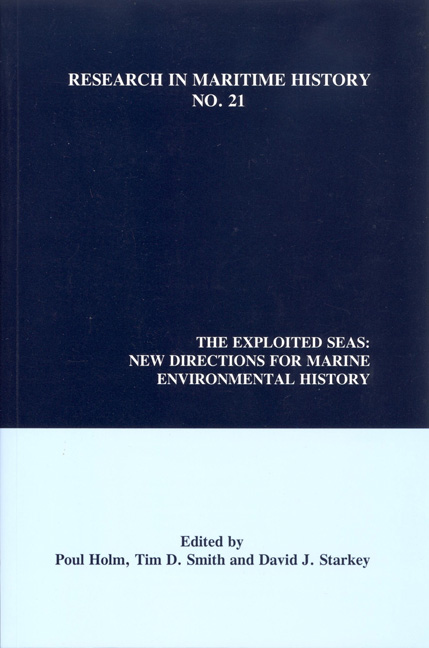Book contents
- Frontmatter
- Contents
- About the Editors
- Contributors
- “Introduction”
- Contributions
- “The Newfoundland Fisheries, c. 1500-1900: A British Perspective”
- “Testing Ecological Models: The Influence of Catch Rates on Settlement of Fishermen in Newfoundland, 1710-1833”
- “Nineteenth-Century Expansion of the Newfoundland Fishery for Atlantic Cod: An Exploration of Underlying Causes”
- “Status and Potential of Historical and Ecological Studies on Russian Fisheries in the White and Barents Seas: The Case of the Atlantic Salmon (Salmo Salar)”
- “The Danish Fisheries, c. 1450-1800: Medieval and Early Modern Sources and Their Potential for Marine Environmental History”
- “Historical Approaches to the Northern California Current Ecosystem”
- “Potential for Historical-Ecological Studies of Latin American Fisheries”
- “The South African Fisheries: A Preliminary Survey of Historical Sources”
- “The Potential for Historical Studies of Fisheries in Australia and New Zealand”
- “Examining Cetacean Ecology Using Historical Fishery Data”
“The Newfoundland Fisheries, c. 1500-1900: A British Perspective”
from Contributions
- Frontmatter
- Contents
- About the Editors
- Contributors
- “Introduction”
- Contributions
- “The Newfoundland Fisheries, c. 1500-1900: A British Perspective”
- “Testing Ecological Models: The Influence of Catch Rates on Settlement of Fishermen in Newfoundland, 1710-1833”
- “Nineteenth-Century Expansion of the Newfoundland Fishery for Atlantic Cod: An Exploration of Underlying Causes”
- “Status and Potential of Historical and Ecological Studies on Russian Fisheries in the White and Barents Seas: The Case of the Atlantic Salmon (Salmo Salar)”
- “The Danish Fisheries, c. 1450-1800: Medieval and Early Modern Sources and Their Potential for Marine Environmental History”
- “Historical Approaches to the Northern California Current Ecosystem”
- “Potential for Historical-Ecological Studies of Latin American Fisheries”
- “The South African Fisheries: A Preliminary Survey of Historical Sources”
- “The Potential for Historical Studies of Fisheries in Australia and New Zealand”
- “Examining Cetacean Ecology Using Historical Fishery Data”
Summary
Abstract
This paper views the prosecution of the Newfoundlandfishery, c. 1500-1900, from a British perspective. It considers the range, quality and utility of the evidence on the fishery in English archives and primary printed sources. The qualitative information provided by practitioners, observers and pamphleteers is examined initially. The discussion thenfocusses on the quantitative material relating to the fishery from the late seventeenth century onwards available in the Colonial Office papers in the Public Record Office. Some tentative results from preliminary analyses of these statistical data are presented. These indicate that the quantity of fish harvested in the eighteenth and nineteenth centuries fluctuated widely but generally increased through the period, attaining levels higher than previous estimates have shown. The catch rate is also examined to test the relationship between catch, effort and stocks. Notwithstanding the quality and volume of the primary sources, the paper concludes by suggesting that a greater research effort in the English archives will yield the data necessary to construct a rounded study of the impact of human prédation on the fish stocks of Newfoundland.
Historians of the fisheries conducted from the British Isles have two main obstacles. First, this is a vast subject, due not just to its ubiquitous nature but also to the complex range of activities involved. At any given time many types of fisheries were prosecuted. While there were marked regional variations in technique, catch and market, numerous contrasting forms might be conducted concurrently from a single port or locality. Second, there are practical problems regarding the collection and interpretation of data, for the primary sources relating to Britain's fisheries are extensive, take many different forms and are scattered in repositories throughout the UK and beyond. The evidence is also uneven, both temporally (comparatively little relates to the pre-1700 period) and topically - some fisheries, and some ports, generated more, or more useful, records.
The fishery and fish trade conducted by Britons (largely Englishmen) from Newfoundland illustrates these problems. While this distinctive trade has received more attention from historians than most British fishing interests, the factors governing its scale, character and significance are still imperfectly understood. This is partly due to the complexities of the political, economic, social and environmental issues that arise in examining it. But it also reflects the abundance, deficiencies and idiosyncrasies of the primary records pertaining to the business.
- Type
- Chapter
- Information
- The Exploited SeasNew Directions for Marine Environmental History, pp. 1 - 12Publisher: Liverpool University PressPrint publication year: 2001

